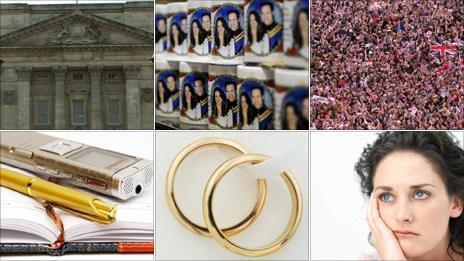Royal wedding: The naysayers
- Published
- comments

The UK media is saturated with coverage of Prince William's forthcoming marriage to Kate Middleton. But what about those who don't think the event is important?
You'll have put up the bunting, then? Organised the street party? Filled your house with souvenirs and commemorative pull-out supplements?
And obviously you'll want to read all about the happy couple? Where they're going on honeymoon? Whether they've chosen canapes or sausages-on-sticks for the finger buffet?
No? What do you mean, no?
Studying much of the UK media's coverage of the Prince William and Kate Middleton's forthcoming wedding, you'd be forgiven for thinking that its advent had gripped the entire nation in a state of fevered, restless anticipation.
In the four months since the couple's engagement was announced, there have been thousands of mentions of the term "royal wedding" in the UK's national newspapers while broadcasters, including the BBC, have been equally diligent in their pursuit of the story.
Yet polls suggest the British public is not quite so uniformly receptive.
In a ComRes survey, external of 1,006 British adults conducted in November 2010, a clear majority said they were "not excited" by the wedding.
Of the sample, some 31% said they "couldn't care less" about the event and a further 28% described themselves as "largely indifferent".
Groups which call for the abolition of the monarchy acknowledge that they are in a minority, with most opinion polls putting dedicated republicans at around one-fifth of the population compared with around 70% backing the present system.
But a glance at readers' comments below any online news story about the marriage indicates the prevalence of antipathy towards nuptial ubiquity.
Comedian Arthur Smith, best known for his curmudgeonly turns on TV's Grumpy Old Men, is aggrieved that journalists are focusing on one matrimonial ceremony at a time of austerity at home and unrest abroad.
"What I hate most is the assumption that I care, when in fact I very much do not," he barks.
"There are lots of important things happening right now and yet we keep hearing about it over and over again. I don't care about my friends' weddings, never mind theirs.
"It's the inescapability of the whole thing - you can't get away from it even if you want to."
Not all of those who express such sentiments are republicans or, indeed, grumpy old men like Smith.
The Daily Telegraph columnist Bryony Gordon is, in keeping with her newspaper's editorial slant, steadfastly pro-monarchy. As a 30-year-old woman she belongs to a demographic that advertisers and editors no doubt visualise cooing over bridal gowns and wedding favours.
And yet she does believe the coverage - to which she has grudgingly contributed - has amounted to overkill, antagonising those who might otherwise be sympathetic to the House of Windsor as an institution.
Additionally, she argues that the very currency of a royal wedding has been devalued from 1981 when 28 million people watched the marriage of Prince Charles and Princess Diana. Exposure of and the rise of celebrity culture may be to blame.
"It's not like in the early 80s when the royals were the big celebrities," she says. "Posh and Becks have usurped them. They even had thrones when they got married.
"Everyone has a royal wedding now - the average one in Britain costs about £20,000. It's not the big deal it once was.
"Plus, I can't relate to Kate. I don't know why anyone would marry into that family, for a start."
With even such a natural royalist repelled by the blanket coverage, Palace officials might be expected to worry about its impact on support for the crown as an institution.
Indeed, on the eve of the 2010 wedding of Sweden's Crown Princess Victoria, support for the country's monarchy slumped to its lowest-ever figure of 46%.
Graham Smith, campaign manager for the pressure group Republic, which calls for an end to the monarchy, does not expect a surge in support for an elected head of state in the run-up to 29 April.
Nor is he happy about the amount of coverage the event has so far received, having complained to the BBC for reporting it in a way which he feels has marginalised republican sentiment and insufficiently represented the fact the monarchy is a contested political institution.
But he does hope that the irritation felt by those either normally supportive of the monarchy or indifferent to its constitutional role will compel them to think carefully about the role it plays in British life.
"Politicians and the media are behind the curve," he says. "They don't realise that Britain has moved on. We are far less deferential as a society and as a nation.
"Although they aren't demanding a republic, the public are small-"r" republicans in that they want to see a society of equals.
"That's why the obligation is on the media to report it just down the line and always acknowledge the 20% who want to get rid of it all."
Such republicans may not constitute a majority. But whatever festivities mark the wedding itself, there will be plenty of Britons celebrating when the whole thing is over.